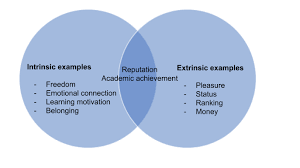One of my favorite authors and thought leaders is Whitney Johnson who is the host of the Disrupt Yourself podcast. One of Whitney’s favorite questions to ask her guests is “What’s a lesson that the world keeps teaching you because you can’t seem to learn it?” (Sidenote: Definitely worth reflecting on this for a few minutes today..)
My answer to this question is equating your self-worth and meaning to your achievements and accomplishments.
If you’re like me, at some point you’ve worked really hard on something that you wanted, achieved that goal, and felt a sense of emptiness after you were finished. Afterward, you set another goal, and worked toward it, achieved it, and then felt a sense of emptiness again.
For many, this is how we were raised or the cues we got from society to follow in order to be seen as successful. It’s why we chased good grades, studied harder on our standardized tests, took on extra leadership positions and worked hard to work at blue chip companies.
None of these in of themselves are bad things, and we wouldn’t be where we were if we didn’t work hard toward goals. But simply chasing titles and accomplishments does not make us fully happy. What if a bigger title, more responsibility, a nicer car, or bigger house didn’t actually make us happier? What if it actually makes us less happy, more lonely, and more lost?
In our always on and transparent world, social media amplifies this by ranking us according to the popularity of our profiles. If someone posts a picture on Instagram or a viral tweet on Twitter, we can easily see how many people respond and how we line up in comparison. For many, we equate likes and engagement to self-worth and accomplishment, and the more we get, the happier we think we will be. It also means we look at what other people are doing, assume that since we are not doing it that we are behind, not enough, or that we need to “achieve more.” But what we soon realize, is that more extrinsic rewards like achievements and titles do not always make us happy.
The Hedonic Treadmill
The concept for this is the hedonic treadmill – or our brains desire to constantly strive for tangible extrinsic motivations, such as titles, accomplishments, or gold stars, only to be disappointed when we get there. But what if happiness doesn’t depend on these extrinsic measures? What if we didn’t just look at titles, promotions, bigger houses and nicer cars as markers of success? What if success was much more than that, and meant something different?
If you’re someone like me, who is achievement oriented and also values achievement you’ve probably fallen into this thinking that your self-worth is tied to your accomplishments and titles. I’m here to tell you that it’s not. This was a hard lesson for me to learn. After all, working hard, getting good grades, winning the approval of our friends and peers are not bad things, in and of themselves. Where it gets dangerous is when we overextend and over-index on them in a way where we equate our own value as a human being to doing more, achieving more, or winning more.
In case you need to hear it I’ll just say for you – you are much more than your titles and accomplishments. And the quicker you can realize this, I’m confident the more you’ll be able to find contentment and happiness in your life. So how can you find more happiness, and have a healthier relationship with achievement?
Embrace What You Have Today
Happiness is not a destination, but rather a part of the journey to the outcome or goal. As long as your happiness is dependent on the belief that you’ll only be happy when you have achieved or accomplished something, you’ll always feel that something is missing, regardless of how many achievements you have. By ridding ourselves of the idea that “we will just be happy when we get to x” we can embrace happiness and look for the joy and meaning into what we have today.
Win Deep, Not Shallow
Dr. Pippa Grange, Author of Fear Less coined this concept of winning deep. Grange came up with this concept of winning shallow and winning deep because she worked with so many successful athletes who seemed to have every marker of success, and from the public view, seemed like absolute champions. But when she talked to them, on the inside, they weren’t fulfilled. Here is what she says:
“Winning shallow is if you’re constantly chasing the next thing, but none of it ever feels like it fulfils you.That’s a very lonely place to be. Winning deep is where you actually manage to achieve that feeling of joy, fulfilment, sense of purpose. Meaning is the central bit.”
Oftentimes, we index for shallow wins – when we’re winning to avoid not being good enough, or winning just to beat someone else or to prove that we can measure up to our peers. At the core, we do this to be seen by others as “good enough.” It’s winning out of a scarcity mindset, and because we’re doubting ourselves.
On the other hand, winning deep, is “where you can actually feel the richness of the journey, you are attached to both the joy and struggle that come with it. Where we can, we need to look for deep wins. Wins that we seek where we’ll enjoy the highs and lows of the journey, not just the outcome involved.

Throughout my life, I’ve been in high-achieving environments with smart, intelligent, driven, and successful individuals. I’m also the son of immigrants, who worked incredibly hard and sacrificed so much in order to make it in America. The majority of time I spend now is with high-driven professionals who want to be successful in all aspects of their life, especially in their careers. In these environments, its easy to get insecure, to feel that you are less than, or to wonder if you are measuring up. But when you’re an MBA student and trying to recruit for the role because everyone else is doing it, is it really succeeding on your own terms? Or if every lawyer or doctor you know does a certain thing, do you have to do it to if it doesn’t serve you?
Define Success on Our Own Terms
Looking to extrinsic measures or guidelines can be helpful in many ways. I would argue that society encourages young children to go to school and study hard and to pursue some form of higher education. And there’s nothing wrong with wanting to work at a brand name company, or get a promotion, or earn a raise.

But if we want to achieve personal meaning out of our lives, we have to balance our desire for extrinsic success with our own intrinsic measure of success. As a high-achiever and someone with a lot of high-achieving friends, it’s hard for me sometimes to see some of my peers who are at a higher level, have higher salaries, or are “doing better than me.” But ultimately, they are marching to their own vision of success, and if I compare myself to them and start to look for shallow wins in order to feel better, I’ll be working toward a version of success that is not my own.
Instead, I’ve spent time thinking and writing down what success looks like for me, coming up with measures or goals for my own definition of success, and why that matters to me. From time to time I play the “compare and despair game,” but eventually, I come back to reality and feel a deep sense of meaning knowing that I am working toward my own definition of success, not what society wants, or what others want.
I wish I could say that I no longer equate self-worth and achievement, but undoing numerous decades of a narrative I taught myself takes time, work, and unlearning. What I have found is when I can catch myself when I am optimizing for shallow wins, or playing the “compare and despair game” I am usually pretty quick to coming back to a healthier mindset. Next time you feel small, play for a shallow win, or want to compare yourself to others and how they are doing remember that you are much more than your accomplishments and achievements.

